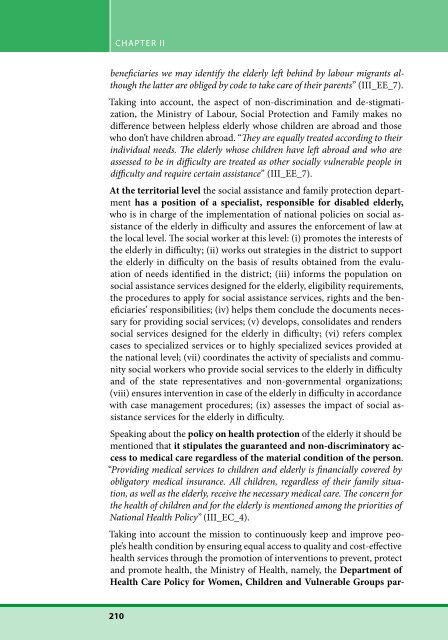specific needs of children and elderly left behind as a ... - IOM Moldova
specific needs of children and elderly left behind as a ... - IOM Moldova
specific needs of children and elderly left behind as a ... - IOM Moldova
You also want an ePaper? Increase the reach of your titles
YUMPU automatically turns print PDFs into web optimized ePapers that Google loves.
CHAPTER II<br />
beneficiaries we may identify the <strong>elderly</strong> <strong>left</strong> <strong>behind</strong> by labour migrants although<br />
the latter are obliged by code to take care <strong>of</strong> their parents” (III_EE_7).<br />
Taking into account, the <strong>as</strong>pect <strong>of</strong> non-discrimination <strong>and</strong> de-stigmatization,<br />
the Ministry <strong>of</strong> Labour, Social Protection <strong>and</strong> Family makes no<br />
difference between helpless <strong>elderly</strong> whose <strong>children</strong> are abroad <strong>and</strong> those<br />
who don’t have <strong>children</strong> abroad. “They are equally treated according to their<br />
individual <strong>needs</strong>. The <strong>elderly</strong> whose <strong>children</strong> have <strong>left</strong> abroad <strong>and</strong> who are<br />
<strong>as</strong>sessed to be in difficulty are treated <strong>as</strong> other socially vulnerable people in<br />
difficulty <strong>and</strong> require certain <strong>as</strong>sistance” (III_EE_7).<br />
At the territorial level the social <strong>as</strong>sistance <strong>and</strong> family protection department<br />
h<strong>as</strong> a position <strong>of</strong> a specialist, responsible for disabled <strong>elderly</strong>,<br />
who is in charge <strong>of</strong> the implementation <strong>of</strong> national policies on social <strong>as</strong>sistance<br />
<strong>of</strong> the <strong>elderly</strong> in difficulty <strong>and</strong> <strong>as</strong>sures the enforcement <strong>of</strong> law at<br />
the local level. The social worker at this level: (i) promotes the interests <strong>of</strong><br />
the <strong>elderly</strong> in difficulty; (ii) works out strategies in the district to support<br />
the <strong>elderly</strong> in difficulty on the b<strong>as</strong>is <strong>of</strong> results obtained from the evaluation<br />
<strong>of</strong> <strong>needs</strong> identified in the district; (iii) informs the population on<br />
social <strong>as</strong>sistance services designed for the <strong>elderly</strong>, eligibility requirements,<br />
the procedures to apply for social <strong>as</strong>sistance services, rights <strong>and</strong> the beneficiaries’<br />
responsibilities; (iv) helps them conclude the documents necessary<br />
for providing social services; (v) develops, consolidates <strong>and</strong> renders<br />
social services designed for the <strong>elderly</strong> in difficulty; (vi) refers complex<br />
c<strong>as</strong>es to specialized services or to highly specialized sevices provided at<br />
the national level; (vii) coordinates the activity <strong>of</strong> specialists <strong>and</strong> community<br />
social workers who provide social services to the <strong>elderly</strong> in difficulty<br />
<strong>and</strong> <strong>of</strong> the state representatives <strong>and</strong> non-governmental organizations;<br />
(viii) ensures intervention in c<strong>as</strong>e <strong>of</strong> the <strong>elderly</strong> in difficulty in accordance<br />
with c<strong>as</strong>e management procedures; (ix) <strong>as</strong>sesses the impact <strong>of</strong> social <strong>as</strong>sistance<br />
services for the <strong>elderly</strong> in difficulty.<br />
Speaking about the policy on health protection <strong>of</strong> the <strong>elderly</strong> it should be<br />
mentioned that it stipulates the guaranteed <strong>and</strong> non-discriminatory access<br />
to medical care regardless <strong>of</strong> the material condition <strong>of</strong> the person.<br />
“Providing medical services to <strong>children</strong> <strong>and</strong> <strong>elderly</strong> is financially covered by<br />
obligatory medical insurance. All <strong>children</strong>, regardless <strong>of</strong> their family situation,<br />
<strong>as</strong> well <strong>as</strong> the <strong>elderly</strong>, receive the necessary medical care. The concern for<br />
the health <strong>of</strong> <strong>children</strong> <strong>and</strong> for the <strong>elderly</strong> is mentioned among the priorities <strong>of</strong><br />
National Health Policy” (III_EC_4).<br />
Taking into account the mission to continuously keep <strong>and</strong> improve people’s<br />
health condition by ensuring equal access to quality <strong>and</strong> cost-effective<br />
health services through the promotion <strong>of</strong> interventions to prevent, protect<br />
<strong>and</strong> promote health, the Ministry <strong>of</strong> Health, namely, the Department <strong>of</strong><br />
Health Care Policy for Women, Children <strong>and</strong> Vulnerable Groups par-<br />
210

















